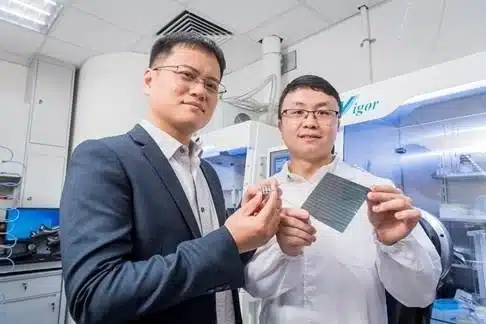A new research initiative at the City University of Hong Kong (CityUHK) develop more affordable and efficient solar energy by enhancing the stability and reliability of perovskite solar cells.

The latest research introduces a simplified device structure that promises to boost the commercial viability of perovskite solar cells. Dr. Zhu Zonglong, Professor, Department of Chemistry, City University of Hong Kong noted, “The improvements in stability and the simplification of the production process of perovskite solar cells represent a significant step forward in making solar energy more accessible and affordable.” The mineral perovskite is integral to the efficient conversion of sunlight into electricity.
The research team has made notable advancements in solar cell design, focusing on two key innovations that enhance efficiency and longevity. The first innovation integrates hole-selective materials with perovskite layers, streamlining the manufacturing process. The second involves using an inorganic electron transport layer made of tin oxide, which replaces traditional organic materials like fullerene and BCP. Dr. Gao Danpeng, a post-doctoral researcher and co-author, City UHK stated, “The device structure reported in this study represents the most simplified architecture in the current field of perovskite solar cells, offering significant advantages for industrialization.” This new structure reduces material costs and simplifies production steps by eliminating the need for an organic transfer layer.
Initial findings from the study are promising, with the team achieving power conversion efficiencies exceeding 25%. As reported by prof. Zhu, they maintained over 95% efficiency after 2,000 hours of rigorous testing. This performance surpasses the longevity benchmarks set by traditional perovskite solar cells, making it a viable option for mass production. Potential beneficiaries include researchers in materials science, renewable energy companies, solar cell manufacturers, and policymakers focused on environmental protection, all of whom stand to gain from the efficiency and durability of these innovative solar cells.
The next phase of this project aims to apply the innovative structure to larger perovskite solar modules, further improving efficiency and scalability. Collaborating with the National Renewable Energy Laboratory and Imperial College London highlights the global commitment to sustainable energy solutions. Prof. Zhu emphasized, “With the potential to be implemented in solar energy systems within the next five years, this research is a critical step towards achieving more sustainable and environmentally friendly energy production globally.”







